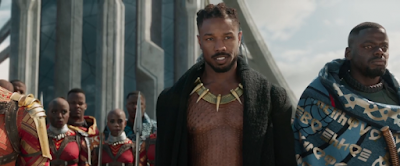'Black Panther' and An American Made Villain
A short analysis on the MCU's best villain yet
By: Josh McCormack
My Sociology professor at UNCA gave an assignment to all of her students who were planning on seeing "Black Panther" on opening weekend. We had to write an analysis of the film through the perspective lens of race in America. Here is what I noticed while watching MARVEL's magnificent 18th feature:
------------------------------------------------------------------------
My Sociology professor at UNCA gave an assignment to all of her students who were planning on seeing "Black Panther" on opening weekend. We had to write an analysis of the film through the perspective lens of race in America. Here is what I noticed while watching MARVEL's magnificent 18th feature:
------------------------------------------------------------------------
Oakland, 1992.
This is the setting of the opening scene for director Ryan Coogler’s “Black Panther”. The film does not begin in the far reaches of space or within some high tech government laboratory like most MARVEL studios films. Instead we are thrown into an African American community that has been personally affected by the repercussions of Rodney King’s beating a year prior and the ongoing LA race riots.
“Black Panther” is a film that celebrates African culture and is a huge step forward for racial representation in mainstream entertainment. From its proud afrofuturist aesthetic to the amazing ensemble cast of black actors, Ryan Coogler and the studio heads at MARVEL have made a film that is guaranteed to have audiences on the edge of their seat with excitement. Yet it’s also one that understands a simple, but somewhat ignored, truth in blockbuster films; the mistreatment of African Americans by the United States throughout history is not something that can just be brushed aside when telling an afrocentric story.
Nowhere is this concept more evident than in the villainous character of Erik Killmonger played by Michael B. Jordan.
Killmonger is the only lead character not born to the fictional, technological wonderland of Wakanda. Instead, Killmonger has lived his whole life in a country with systematic racism that has kept him from the luxuries of his blood relatives living in Wakanda.
As a young Erik says to his father in a flashback sequence, “Everybody dies here. It’s just life in this place.”
While much has been said about how the film looks at Africa through a flattering lens, the film practically takes the opposite approach when looking at the United States.
Most mainstream action films are about the US being invaded by a stereotypically portrayed foreign adversary who wants something that America has in order to liberate his or her people in a their home country. However, in the case of “Black Panther”, Erik Killmonger is a surrogate for African Americans who never found the US to be a “promised land”. The American is now in the opposite position than other movies of this type.
To him, like so many, this is a society that he would have never been stuck in willingly and the injustices his people face require a revolt that can only come about from the vibranium weapons technology that Wakanda and its king, T’Challa (aka Black Panther), is so reluctant to reveal to the outside world. This lack of interference from the advanced society, told to him by his deceased, Wakandan father is something that infuriates him. Killmonger’s attempt to steal the throne from his cousin T’Challa is his birthright, but he does it not because he wants to feel power, but because he believes that the technology of Wakandans should be given to all black people in order to rise up against their oppressors. The way in which he plans to go about this is incredibly villainous, but at the core you completely understand his plan and sympathize with the oppression of Africans he is speaking of.
“Black Panther” at its core is mass entertainment. Overall, you would be hard pressed to find anyone, no matter where they land on the political spectrum, who won’t get some enjoyment out of it. Yet what makes it stand out is how much representation and race plays into the story. Diversity is important in entertainment and many films of recent memory have been taking strides to make their stories as diverse as possible. But “Black Panther” is a story that displays its Afrocentricity openly and proudly. To have a writer and director of color calling the shots, he’s able to tap into the experience of African Americans in a way not many others have before.
In 2015 Ryan Coogler told an interviewer that “Black Panther” would be his most personal film to date. All one needs to do is look at Michael B. Jordan’s portrayal of Erik Killmonger and you start to understand what Coogler meant.
The best villains are the ones you can’t help but side with every once in a while. And Killmonger fits that bill spectacularly. In his final moments, T’Challa feels for this character. His death is not victorious and not one where the audience can applaud like most superhero movies. It’s tragic and powerful.
When T’Challa gives Killmonger the opportunity to be healed, Killmonger resists the idea knowing that he will just become a captive to the Wakandan government.
“Bury me in the ocean with my ancestors,” he says. “Because they knew death was better than bondage.”
Erik Killmonger is a monster, yes. But he is a monster made in America.



Comments
Post a Comment